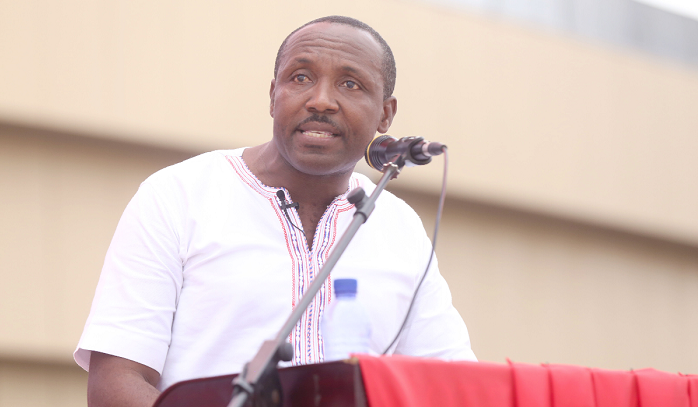The rank and file of the New Patriotic Party (NPP) are against President Nana Addo Dankwa Akufo-Addo's pledge and commitment to elect Municipal, Metropolitan and District Chief Executives (MMDCEs), the General Secretary of the NPP, Mr John Boadu has said.
According to him, the disapproval of the election of MMDCEs by the members was because they believe the party will lose out on rewarding its hardworking members who have mobilised support for the party at the local level if those positions become elective rather than appointive.
The disapproval came up for discussion at a two-day retreat on multi-party local governance in Big Ada, organised by the Institute for Democratic Governance (IDEG) for a section of ministers, Members of Parliament (MPs) and national executives of the ruling party on the election of MMDCEs.
Related articles
‘Adopt bi-partisan approach to MMDCEs election bill’
Bill on election of MMDCEs submitted to Parliament
Unpopular decision
Mr Boadu, who was first to bring up the subject of the disapproval of the election said “internally, this is not a popular decision. And members are saying, ‘Why not keep things the way they are for a while?’” he said.
His comments were supported by the National Organiser of the NPP and the Board Chairman of the National Youth Employment Agency (NYEA), Mr Sammy Awuku, and the Volta Regional Party Secretary, Mr Joseph Homenya.
Mr Awuku said the appointment of local authorities by the President was necessary to maintain some balance and order in the rank and file of the party after elections, thus electing them would be a loss of that function.
Additionally, he was sceptical about the election of MMDCEs in areas predominately thought to be affiliated to or ‘world banks’ of either the NPP or the National Democratic Congress (NDC).
That would mean that all the MMDCEs elected in such areas would constantly be from the opposition party, which might make them oppose the President's policies.
For Mr Homenya, district chief executives (DCEs) were so powerful at the local level that it was unthinkable for anyone not from the same party as the President to assume that position.
Some other participants were of the view that a President could also starve districts with opposition MMDCEs of development resources.
Nation before party
In a sharp rebuttal, however, a Senior Research Fellow of IDEG, Mr Kwesi Jonah, chided them saying, “All these arguments boil down to putting the party's interest above the national interest.”
“People in every part of this country are entitled to development as of right. We cannot entrench democracy in the country by putting party interests before the national interest,” he added.
The Executive Director of IDEG, Dr Emmanuel Akwetey, for his part said the disapproval was based on the assumption that Ghanaians were comfortable with the status quo and did not want to change.
That, however, was not so, because surveys such as the Afrobarometer 2018 showed that political parties were losing their influence in becoming change agents, as pastors became the most sought-after leaders by people in communities with challenges.
“It shows that support for political parties in terms of delivering development is waning,” he added.
The election, therefore, presented opportunities for political parties to seize the moment and transform into change agents to impact the lives of Ghanaians, he said.
Unfit for purpose
Prior to the discussion, another Senior Research Fellow of IDEG, Prof. Atsu Ayee, in an assessment of the country’s decentralisation structure so far, said weaknesses required reforms, while Prof. Ransford Gyampo of the University of Ghana emphasised the amendment of Article 55(3) of the 1992 Constitution for the full participation of political parties in the contests in development at the local level for the best options.
The Dean of the School of Law of the University of Ghana, Prof. Kofi Quashigah, also gave a presentation on the processes of amending entrenched and non-entrenched provisions of the 1992 Constitution.

